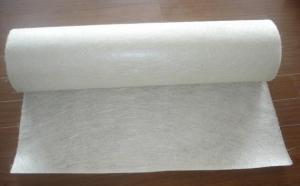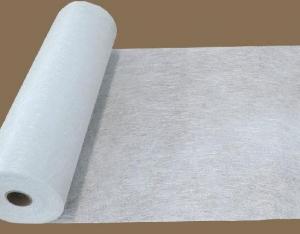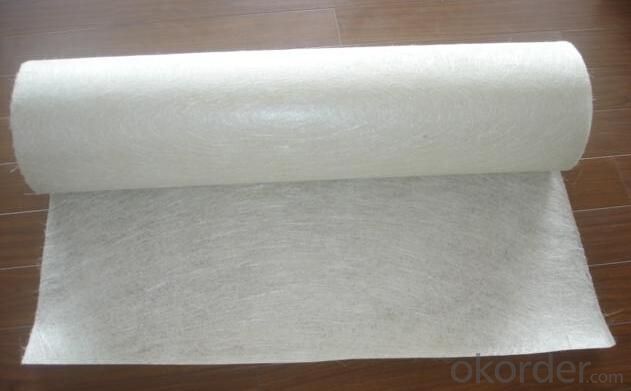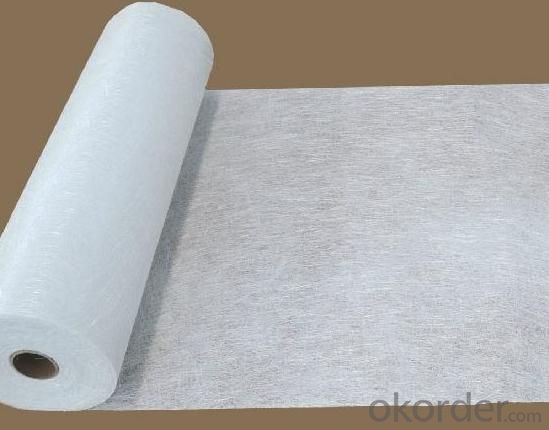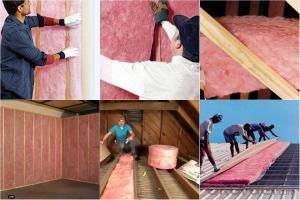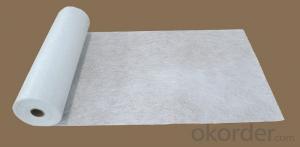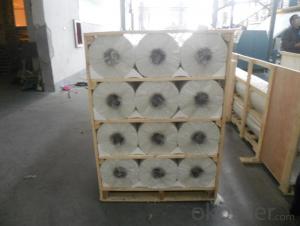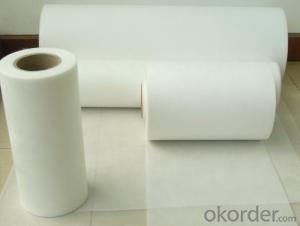Fiberglass Mat Tissue 'е-стекломат московский пятно, хорошее качество'
- Loading Port:
- China Main Port
- Payment Terms:
- TT or LC
- Min Order Qty:
- -
- Supply Capability:
- 21000kg kg/month
OKorder Service Pledge
OKorder Financial Service
You Might Also Like
Стекломат эмульсионный
Эмульсионный стекломат производится из Е-стекло ровинга,клиееного эмульсионным вяжущим,обладает хорошей способностью смачивания с полиэфирным,виниловым и эпоксидным смолам.
Продукты из данного стекломата преимущественно перерабатываются методами ручного формования,намотки и прессования, широко применяются для производства разных стеклопластиков,корпусов лодок,автомобильных запчастей и охлаждающих башен.
Мы поставляем стекломат 300г\450г\600г по ширине 1250мм !!!
Основные преимущества
1.Вследствие хорошей целостности достигает более высокого стеклосодержания и коэффициента армирования,чтобы повышает механической прочности стекпластика
2.Данный стекломат отличается хорошей целостностью и формуемкостью,малым выделением летучних веществ в процессе переработки;
3.Отличная гибность подходит к формованию
4.Быстрая и полная смачиваемость в смоле,малая потребность смолы преведут к снижению себестоимости производства,повышению производительности и механических свойств конечных продуктов.
Упаковка:
Стекломат намотан на бумажные патроны.Рулоны заворачиваются пластмассовыми плеками,уложены в бумажные коробки,или заворавиваются крафт-бумагой.Рулон должны положить горизонтально.В транспортировке рулоны могут прямо загружать в котейнеры или с помошью поддонов.
Добро пожаловать посетить наш склад !
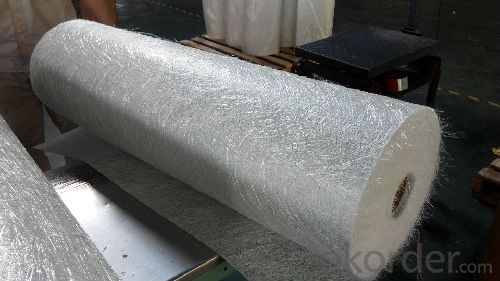
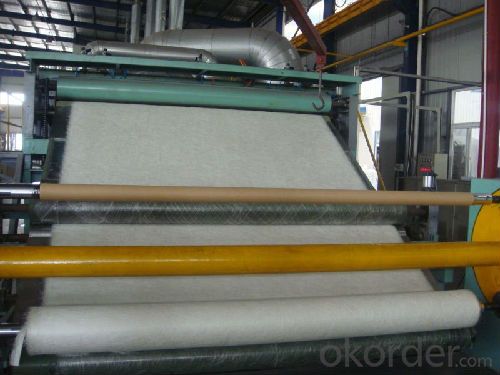
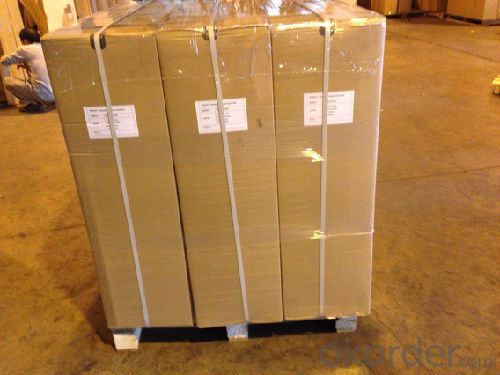
- Q: Can fiberglass mat tissue be used in high-temperature applications?
- Unfortunately, high-temperature applications do not permit the usage of fiberglass mat tissue.
- Q: What is the specific gravity of fiberglass mat tissue?
- The specific gravity of fiberglass mat tissue can vary depending on the specific composition and manufacturing process. However, generally speaking, fiberglass mat tissue typically has a specific gravity ranging from 1.8 to 2.2. Specific gravity is a measurement that compares the density of a substance to the density of a reference substance, usually water. A specific gravity of 1.0 indicates that the substance has the same density as water, while a value greater than 1.0 indicates a higher density. Therefore, the specific gravity of fiberglass mat tissue suggests that it is denser than water.
- Q: How is fiberglass mat tissue used in the production of shower enclosures?
- Fiberglass mat tissue is commonly used in the production of shower enclosures due to its excellent properties and benefits. It is a thin and flexible material made up of fine glass fibers that are randomly distributed and bonded together with a resin binder. In the production process of shower enclosures, fiberglass mat tissue is primarily utilized as a reinforcement material. It is often applied to the surface of the enclosure structure to enhance its strength, durability, and resistance to cracking or breaking. Firstly, the fiberglass mat tissue is cut and sized to fit the specific dimensions of the shower enclosure. It is then carefully laid or applied onto the surface of the enclosure, usually through a process called hand lay-up or spray-up. The mat tissue is positioned strategically to cover all the critical areas that require reinforcement, such as corners, edges, and joints. Once the mat tissue is in place, a resin, typically polyester or epoxy, is applied over it. The resin infiltrates the fiberglass mat tissue and bonds with the fibers, creating a solid and robust composite structure. This resin-fiberglass combination provides additional strength and stability to the shower enclosure, making it more resistant to impact, stress, and environmental factors like water and humidity. Moreover, fiberglass mat tissue also contributes to the overall aesthetics of the shower enclosure. It can help create a smooth and uniform surface finish, eliminating imperfections and creating a visually appealing appearance. The mat tissue can be easily molded or shaped to match different designs and styles, enabling manufacturers to produce shower enclosures with various shapes, sizes, and patterns. In summary, fiberglass mat tissue plays a crucial role in the production of shower enclosures by providing reinforcement, strength, durability, and aesthetic benefits. It is a versatile material that enhances the overall performance and visual appeal of the enclosures, ensuring they can withstand daily use and maintain their quality over time.
- Q: Is fiberglass mat tissue resistant to compression?
- Indeed, compression resistance is a quality possessed by fiberglass mat tissue. Comprising numerous layers of delicate glass fibers that are bound together by a binder, this material exhibits exceptional structural integrity and strength. Consequently, it can endure substantial loads without distorting or compromising its shape. This remarkable attribute renders fiberglass mat tissue highly sought-after in numerous sectors, including construction, automotive, aerospace, and marine industries, where resistance to compression is imperative. Furthermore, fiberglass mat tissue is renowned for its exceptional dimensional stability, which further augments its ability to withstand compression.
- Q: Can fiberglass mat tissue be used for insulation in cold climates?
- Insulation in cold climates can be achieved using fiberglass mat tissue. This material is renowned for its exceptional thermal insulation qualities, making it a favored choice for insulating structures in colder regions. By design, fiberglass mat tissue traps air pockets within its structure, effectively preventing heat transfer and maintaining warmth inside the building. This solution is not only cost-effective but also efficient in insulating walls, roofs, and floors in cold climates, resulting in reduced energy consumption for heating. Moreover, fiberglass possesses moisture resistance and retains its insulation properties even in extremely low temperatures. In summary, fiberglass mat tissue is a suitable option for insulation in cold climates due to its thermal insulation capabilities, durability, and resistance to moisture.
- Q: How does fiberglass mat tissue perform in terms of mold and mildew resistance?
- Fiberglass mat tissue generally performs well in terms of mold and mildew resistance. The material's non-porous nature and moisture resistance help inhibit the growth of mold and mildew. Additionally, fiberglass mat tissue is often treated with anti-fungal agents during the manufacturing process, further enhancing its resistance to mold and mildew. However, it is important to note that proper installation and maintenance are crucial to ensure optimal mold and mildew resistance.
- Q: How does fiberglass mat tissue compare to mineral wool insulation?
- Fiberglass mat tissue and mineral wool insulation have different properties and applications. Fiberglass mat tissue is typically used as a reinforcement material for composites or as a facing material for insulation products. It provides good strength, flexibility, and resistance to moisture. On the other hand, mineral wool insulation is primarily used for thermal and acoustic insulation in buildings. It offers excellent fire resistance, sound absorption, and thermal performance. While both materials have their own advantages, the choice between them depends on the specific requirements of the project.
- Q: Can fiberglass mat tissue be used for reinforcing swimming pools?
- Yes, fiberglass mat tissue can be used for reinforcing swimming pools. Fiberglass mat tissue is a strong and durable material that is commonly used in various construction applications, including swimming pools. It is lightweight, flexible, and resistant to water, chemicals, and corrosion, making it an ideal choice for reinforcing the structure of swimming pools. The fiberglass mat tissue is typically applied to the surface of the pool using a resin-based adhesive, creating a strong bond and enhancing the overall strength and stability of the pool. Additionally, the use of fiberglass mat tissue can help prevent cracking and improve the longevity of the swimming pool, making it a popular choice among pool builders and owners.
- Q: Can fiberglass mat tissue be recycled?
- Indeed, recycling is a viable option for fiberglass mat tissue. Fiberglass, composed of glass fibers and resin, allows for reusing both elements. To recycle, the glass fibers and resin are separated, typically via mechanical grinding or melting techniques. The isolated fibers are subsequently employed in the production of fresh fiberglass products like insulation, roofing materials, or even new fiberglass mat tissue. The recycling of fiberglass plays a critical role in lessening the environmental impact of this material by diverting it from landfills and conserving valuable resources. It's important to acknowledge, however, that the recycling process can be intricate and costly, which means not all recycling facilities may accept fiberglass mat tissue.
- Q: Can fiberglass mat tissue be used for repairing fiberglass RVs?
- Yes, fiberglass mat tissue can be used for repairing fiberglass RVs. Fiberglass mat tissue is a lightweight, flexible material that is commonly used for reinforcing and repairing fiberglass structures. It is designed to be easily molded and shaped to fit the contours of the damaged area, making it ideal for repairing RVs, which often have curved surfaces. To repair a fiberglass RV using fiberglass mat tissue, the damaged area needs to be cleaned and prepared by removing any loose or damaged fiberglass. The mat tissue is then cut to the appropriate size and shape to cover the damaged area. A suitable fiberglass resin or adhesive is applied to both the damaged area and the backside of the mat tissue. The tissue is then carefully placed over the damaged area and pressed down to ensure proper adhesion. Once the repair is complete, the fiberglass resin or adhesive is allowed to cure according to the manufacturer's instructions. After curing, the repaired area can be sanded, primed, and painted to match the rest of the RV's exterior. It is important to note that fiberglass mat tissue is typically used for smaller repairs and cosmetic damage. For larger structural repairs, it may be necessary to use additional reinforcement materials such as fiberglass cloth or woven roving. It is recommended to consult with a professional or refer to specific repair guides for detailed instructions on repairing fiberglass RVs.
Send your message to us
Fiberglass Mat Tissue 'е-стекломат московский пятно, хорошее качество'
- Loading Port:
- China Main Port
- Payment Terms:
- TT or LC
- Min Order Qty:
- -
- Supply Capability:
- 21000kg kg/month
OKorder Service Pledge
OKorder Financial Service
Similar products
Hot products
Hot Searches
Related keywords
